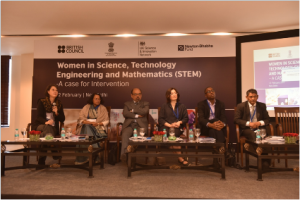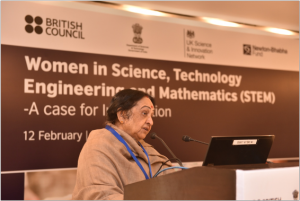10th March 2015 New Delhi, India
UK-India Workshop on Women in STEM – A Case for Intervention
The UK Science and Innovation Network, together with the British Council and the Department of Science and Technology (DST) organised a half-day workshop on ‘Women in Science, Technology, Engineering and Mathematics – A Case for Intervention’ on 12th February 2015 at New Delhi. The event was held on the sidelines of the ‘Global Education Dialogue – Women and Leadership’ organised by the British Council, which included representation from eight countries. There was participation from a wide range of stakeholders and subject matter experts from UK and India to share knowledge and best practices for promoting and supporting participation and progression of women in STEM education and careers. This was organised to take forward the initial dialogue between both countries who agreed to explore opportunities to develop future work through the Newton-Bhabha Fund in the area of diversity in science, particularly the representation of women in leadership roles.
The event comprised of three sessions, each focusing on the major issues faced by women in STEM, particularly women in early career research, the missing statistics and international mobility. There were delegates and participants from a range of organisations namely, Department of Biotechnology, DST, Indian Institute of Science, National Institute of Science Technology and Development Studies, Biotech Park for Women, Defence Institute of Physiology and Allied Sciences and Jawaharlal Nehru Centre for Advanced Scientific Research from India, and University of Sussex, University of Manchester, Department of Business, Innovation and Skills, Research Councils and Liverpool School of Tropical Medicine from UK.
In Session I and II, there was discussion about the existing programmes led by DST since the last 13 years and their impact at ground level. The UK delegates brought to fore the analysis of Prof. John Perkins’ Review of Engineering Skills, Equality Challenge Unit’s Athena SWAN Charter and the review by Paul Roberts (2006) to highlight similar problems existing in Europe, particularly the UK. The panellists discussed about tackling gender perception about science at schools, focussing on institutional and organisation culture towards women in STEM, requirement of a consistent and coherent policy, requirement of updated quantitative data and barriers to mobility, among others. Several issues were addressed during the stimulating deliberations which led to the following recommendations in Session III:
- Institutional support for women in STEM
- Childcare and elderly care leave to be extended to men
- State wise collection and collation of data in the field
- UK India collaboration for women students and scientists
- Evaluate existing retention programmes for women
- Exchange programmes for women at doctoral and post doctoral level; visiting professorship programmes for women required
- Women representation in all Government led delegations
- Awareness and orientation programmes for women
There seem to be many synergies between UK and India that could be explored in the area of facilitating and supporting women in STEM. A detailed report of the workshop deliberations and the recommendations can be viewed here. The report was shared with stakeholders, including the relevant Ministries for follow up action. To take this forward, we will continue working in the sphere through periodic engagement between the two countries to identify areas where potential UK-India collaborations could be initiated. You may comment below or contact me for further details!


Dear Karanpreet,
How about trying to establish collaborations in fields where the use of science concerns mainly women? For example, the rates of breastfeeding are very low in Kolkata and the reason is mainly because of hospital substitution of infant formula. There seem to be very few people conducting research in this area of women and child health. Could we set up collaborations with the UK in this area?
Regarding issues of STEM, women often find it difficult to integrate into departments where faculty are predominantly men. In fact, what seems to be required is male energy. However, feminine energy, which reaches out to heal through science can also be very important for the advancement of India. How can we encourage women to ‘lean in’…..this is a big problem in our science departments. How cn we help them to value themselves and to express their core?